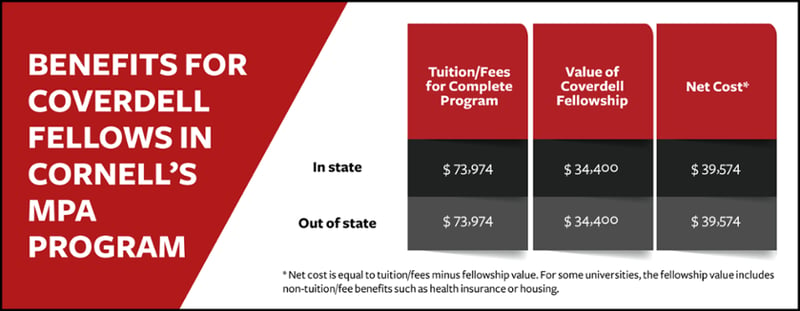5 Reasons Returned Peace Corps Volunteers are Seeking Graduate Degrees in Public Administration

Are you a Returned Peace Corps Volunteer (RPCV) seeking an experiential, cutting-edge graduate degree that will enable you to make a real difference?
There are many reasons that a master’s degree in public administration (MPA) is a popular choice among RPCVs. Read on to learn why getting an MPA may be the perfect step to finding your footing in the professional world.
1. A practical degree for an idealistic mindset: A graduate degree in public administration is perfect for making an impact.
In writing about his time working with the Peace Corps in Azerbaijan, this RPCV noted that the hardest part of his experience was returning home. He felt as if he had lost the passion that he had felt abroad. For mission-driven RPCV's, this is not an uncommon experience.
While coming home after such an intense experience is never easy, enrolling in the right graduate program may mitigate the difficulties of the adjustment. An MPA is a degree for those with purpose and passion, and immersing yourself in impact-focused courses with classmates interested in similar issues can be a fulfilling way to re-adjust to life in the U.S. while still feeding the passion you felt overseas.
2. An MPA provides cutting-edge, interdisciplinary tools for addressing the world's most pressing challenges.
So, what are the foundations of a graduate degree in public administration, and how can they help you to make a difference?
Essentially, there are three main areas that comprise the basis of an MPA curriculum: 1) administrative, political, and policy processes, 2) economic analysis and public finance, and 3) quantitative analysis. A strong foundation in this coursework will give you valuable knowledge, skills, and abilities so that you’re well-equipped to work in the field of public affairs in any capacity that you choose.
3. The skills and knowledge that you gain in the Peace Corps provide a unique framework for your graduate school experience.
Typically, graduate students gain the requisite knowledge in graduate school and then learn later how to apply this knowledge in the real world. RPCVs, however, have gained substantial experience in real-world problem-solving during their time abroad. They return home with a wealth of skills that they’re eager to apply towards a career.
If you are committed to a career path in the field of public affairs, then Cornell University’s MPA may be a perfect fit. Our program offers eight broad concentration options, which allows you to develop personalized expertise in an area of focus. The interdisciplinary nature of our MPA degree is well suited to nontraditional applicants such as RPCVs.
4. The experiential aspect of Cornell’s MPA is perfect for individuals who learn best through practice.
If you committed to the Peace Corps, you’re probably the kind of person who is eager to jump right in and learn as you go along. If this describes your personality, you’re likely to prefer a graduate degree that focuses on experiential learning.
At Cornell, we believe that hands-on experiences are a valuable part of public affairs. As such, our curriculum places significant emphasis on internships, graduate certificate programs, and consulting projects. Through these various experiences, you will become more confident in your knowledge and abilities.
5. You can hone the specialized knowledge you’ve gained overseas to become an expert in a particular area.
What do intellectual property rights have to do with agricultural innovation? What can South Africa’s wine industry teach us about sustainable business? Does climate change pose a particular risk for vulnerable communities? These are only a few of the questions that Cornell’s MPA students are working to answer.
It’s worth noting that some of the concentrations you can choose in Cornell’s MPA program correlate directly to the fields in which Peace Corps professionals work. Not surprisingly, international development is one of our most popular concentrations for RPCVs. However, our students can choose an international or domestic focus for any of the other seven concentrations that we offer. If you worked in community economic development, consider pursuing a concentration in economic and financial policy. Likewise, if you enjoyed working on environmental issues abroad, then why not choose a concentration in environmental policy? Your background will help you to make an even more significant impact.
The Coverdell Fellowship for Returned Peace Corps Volunteers:
Have you heard of the Coverdell Fellowship? It's specifically for Returned Peace Corps Volunteers who want to continue impacting the world for good. The Coverdell Fellowship is a fellowship supported by Cornell's MPA program. The chart below is a breakdown of the benefits of the Coverdell Fellowship:

Here are a few more details you should note about the Coverdell Fellowship at Cornell University:
- You must be a returned Peace Corps volunteer.
- Program fellows complete internships in underserved communities.
- Tuition awards of at least $8,000 a year are extended to fellows. Additional tuition aid, including grants to cover summer internship expenses, may be available for exceptionally qualified fellows.
- Contact Executive Director Thomas O’Toole for more information about the program, or contact the Peace Corps.
Pro Tip: Check out our resource — The Cornell MPA for Returned Peace Corps Volunteers — to learn everything you need to know about jumpstarting your MPA and taking advantage of the Coverdell Fellowship at Cornell University.
As an RPCV, Cornell’s MPA program might be perfect for you:
“Our graduates experience tremendous success finding employment across many key areas of public policy including education, healthcare, criminal justice, sustainability, infrastructure, and economic policy. If you are looking for an opportunity to make valuable contributions to the world around you, then you should make CIPA the next step in your career. ” —Maria Fitzpatrick, CIPA Director and Associate Professor in the Department of Policy Analysis and Management
Here at Cornell University, we believe that our Master of Public Administration program serves as a strong foundation for a fulfilling career. If you have questions about getting an MPA, contact our Admissions Office for more information, or fill out an online application today!


